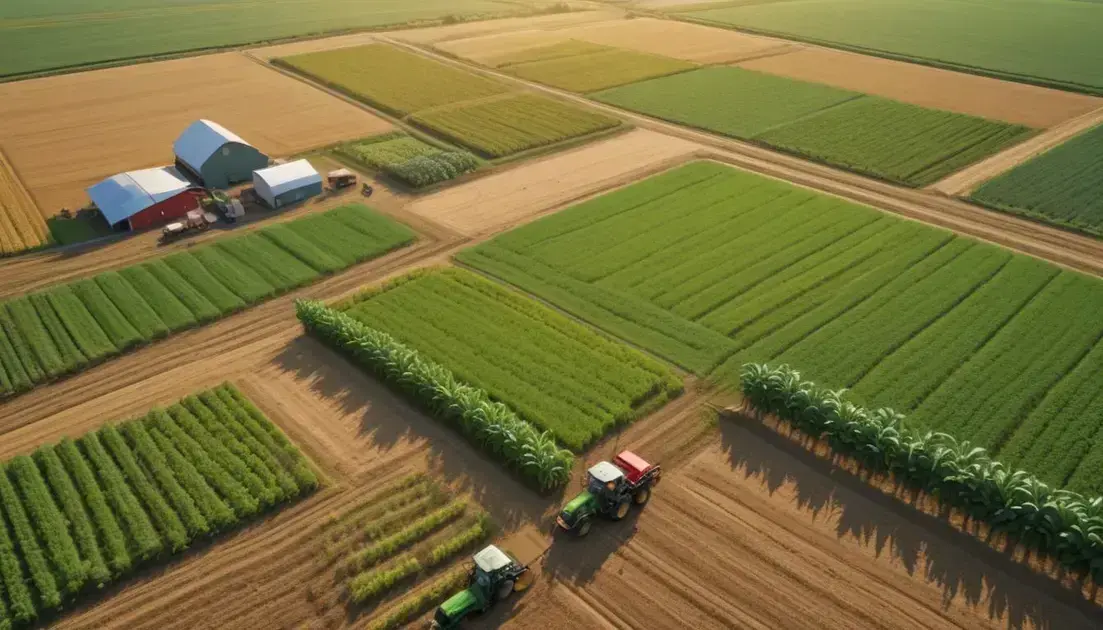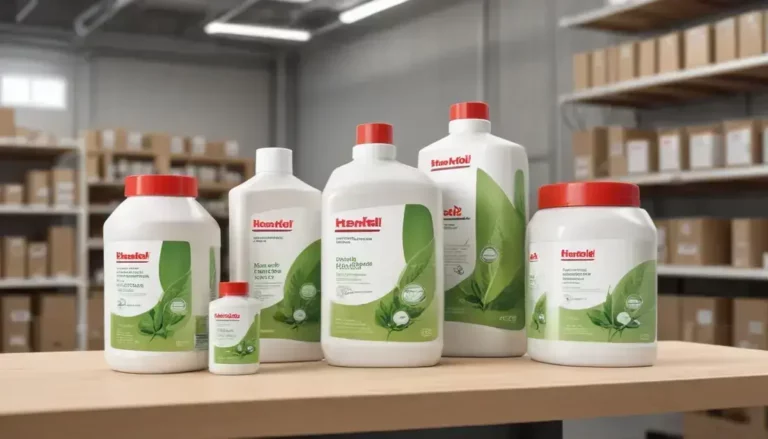PepsiCo and Syngenta: Revolutionizing Agriculture
Sustainable agriculture focuses on practices that enhance soil health, promote biodiversity, and ensure environmental integrity while meeting the growing demand for food, supported by partnerships and technology for improved efficiency and traceability.
Sustainable Agriculture is at the forefront of agricultural innovation. This collaboration between PepsiCo and Syngenta showcases how regenerative practices can reshape our food systems. Interested in how this works?
Introduction to Sustainable Agriculture
Introduction to Sustainable Agriculture emphasizes the need for farming practices that are environmentally friendly and economically viable. By focusing on methods that enhance soil health, crop diversity, and water conservation, sustainable agriculture aims to reduce the negative impacts of traditional farming techniques.
One of the key principles of sustainable agriculture is the integration of regenerative practices, which restore ecosystems while maintaining productivity. Techniques such as crop rotation, cover cropping, and agroforestry not only improve land fertility but also enhance biodiversity.
Additionally, sustainable agriculture fosters community resilience. By supporting local farmers and encouraging organic practices, we can create a more robust food system that is less reliant on harmful chemicals and practices. Education and awareness play crucial roles in promoting these methods, connecting consumers with sustainable products.
Moreover, businesses like PepsiCo and Syngenta are showing leadership in this area by collaborating on sustainable sourcing initiatives that focus on long-term agricultural success without compromising environmental integrity. Such partnerships highlight the importance of sustainability in the global food supply chain.
PepsiCo and Syngenta’s Partnership
The partnership between PepsiCo and Syngenta marks a significant commitment to advancing sustainable agriculture. This collaboration focuses on innovative practices that mitigate environmental impact and enhance food productivity. By leveraging Syngenta’s agricultural expertise, PepsiCo aims to strengthen its supply chain while promoting eco-friendly practices.
One of the cornerstones of this partnership is the implementation of advanced technologies. These technologies offer data-driven insights, helping farmers optimize crop yields and manage resources effectively. The use of precision farming techniques ensures that inputs are used judiciously, reducing waste and increasing efficiency.
Moreover, a core goal of this collaboration is to promote biodiversity. By encouraging diverse planting and ecological practices, the partnership seeks to create resilient farming systems that can withstand challenges such as climate change. This approach not only benefits farmers but also contributes to global food security.
Furthermore, through joint initiatives, PepsiCo and Syngenta are working to educate farmers about the benefits of sustainable practices. By providing training and resources, they empower local communities to adopt these methods, ultimately leading to better environmental outcomes and economic viability.
Benefits of Regenerative Practices
Regenerative practices offer numerous benefits that extend beyond traditional agriculture. These methods prioritize soil health, biodiversity, and ecosystem resilience, laying the groundwork for sustainable food production. By utilizing techniques like cover cropping and reduced tillage, farmers not only enhance soil structure but also boost its nutrient content.
One significant advantage of regenerative practices is their ability to sequester carbon. Healthier soils act as carbon sinks, helping to mitigate climate change impacts. This process not only benefits the environment but also contributes positively to farmers’ bottom lines by potentially qualifying them for carbon credit programs.
In addition, regenerative farming methods can reduce dependency on chemical fertilizers and pesticides. By promoting natural ecosystems and beneficial organisms, farmers often find that pests are controlled more effectively without harmful chemicals, resulting in safer food and healthier environments.
Moreover, regenerative practices foster agricultural diversity, which enhances resilience against pests and diseases. This diversity creates a more stable farming system that can better withstand fluctuations in weather and climate. Ultimately, embracing regenerative practices leads to a more sustainable agricultural model that yields healthier food while preserving resources for future generations.
Impacts on Supply Chain Traceability
Supply chain traceability is becoming increasingly vital in the context of sustainable agriculture. By leveraging advanced technologies, companies can monitor every stage of the supply chain, from production to distribution. This transparency not only builds consumer trust but also ensures adherence to sustainability standards.
One key aspect of enhanced traceability is the use of blockchain technology. This decentralized system allows stakeholders to record and verify transactions securely, creating an immutable record of how food products are sourced, processed, and delivered. This level of visibility helps identify inefficiencies and ensures compliance with environmental regulations.
Moreover, improved traceability strengthens the resilience of supply chains. In the event of a disruption, companies can quickly trace back to the source of the issue, minimizing waste and maintaining product integrity. This agility is crucial in today’s fast-paced market, where consumer demands for accountability are growing.
Additionally, by providing detailed information on sourcing practices, brands can connect with consumers who prioritize sustainability. This connection not only enhances brand loyalty but also supports local farmers who adhere to responsible practices. Overall, the impacts of supply chain traceability extend far beyond compliance; they foster a culture of sustainability that benefits the entire agricultural ecosystem.
Future of Sustainable Sourcing
The future of sustainable sourcing looks promising as businesses increasingly recognize the importance of ethical practices. Companies are moving towards transparency in their supply chains, driven by consumer demand for products that are not only high-quality but also socially responsible.
One major trend is the integration of technology to enhance sourcing practices. New advancements, such as artificial intelligence and blockchain, facilitate better tracking of materials from farm to table. These tools provide insights that help businesses make informed decisions regarding their sourcing strategies.
Sustainable sourcing also emphasizes local economies, promoting partnerships with smallholder farmers and producers. This not only ensures fresh and diverse products but also supports community development. By investing in local agriculture, companies can contribute to improved livelihoods and environmental sustainability.
Another vital aspect is the adoption of certification programs that validate sustainable practices. Certifications such as Fair Trade and Organic assure consumers that their purchases align with their values. As these practices gain traction, we can expect to see more brands embracing sustainability in their sourcing initiatives.
Ultimately, the future of sustainable sourcing will hinge on collaboration among all stakeholders in the supply chain. By working together, businesses can create systems that not only benefit their bottom line but also promote a healthier planet.
In Conclusion: The Path Forward in Sustainable Agriculture
As we look towards the future, it’s clear that the journey to sustainable agriculture is more important than ever. Partnerships between companies like PepsiCo and Syngenta showcase how collaboration can lead to innovative solutions that benefit both the environment and the economy.
Adopting regenerative practices not only enhances soil health and biodiversity but also offers significant benefits in terms of efficiency and resilience against climate challenges. Moreover, improved supply chain traceability ensures transparency and builds consumer trust.
By focusing on sustainable sourcing, businesses can support local economies while meeting growing consumer demands for responsible products. Investing in technology and certifications will further enhance these efforts.
Overall, the success of these initiatives relies on the shared commitment of all stakeholders to create a more sustainable and equitable food system for generations to come.
People Also Ask
What are the main benefits of sustainable agriculture?
Sustainable agriculture enhances soil health, promotes biodiversity, and contributes to environmental sustainability while ensuring food security.
How do partnerships like PepsiCo and Syngenta make a difference?
These partnerships drive innovation in agricultural practices, improving sustainability and efficiency across the supply chain.
What are regenerative practices in farming?
Regenerative practices focus on restoring ecosystems by improving soil health through methods like cover cropping and reduced tillage.
How can technology improve supply chain traceability?
Technology such as blockchain enables better tracking of products, ensuring transparency and trust in the sourcing of agricultural goods.
Why is local sourcing important for sustainable agriculture?
Local sourcing supports community economies, reduces transportation emissions, and can offer fresher, more diverse products to consumers.
What role do consumers play in promoting sustainable practices?
Consumers can drive demand for sustainable products by choosing brands that prioritize ethical sourcing and environmentally friendly practices.






